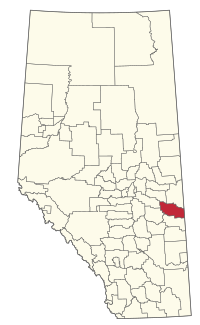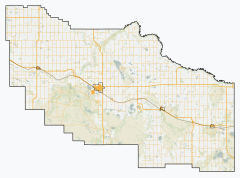Municipal District of Wainwright No. 61
Municipal District of Wainwright No. 61 | |
|---|---|
 Welcome sign | |
 Location within Alberta | |
| Coordinates: 52°50′36″N 110°51′12″W / 52.84333°N 110.85333°W | |
| Country | Canada |
| Province | Alberta |
| Region | Central Alberta |
| Census division | 7 |
| Established | 1942 |
| Incorporated | 1942 |
| Government | |
| • Reeve | Bob Barss |
| • Governing body | MD of Wainwright Council |
| • Administrative office | Wainwright |
| Area (2021)[2] | |
| • Land | 4,095.29 km2 (1,581.20 sq mi) |
| Population (2021)[3] | |
| • Total | 4,446 |
| Time zone | UTC−07:00 (MST) |
| • Summer (DST) | UTC−06:00 (MDT) |
| Website | mdwainwright.ca |
The Municipal District of Wainwright No. 61 is a municipal district (MD) in eastern Alberta, Canada. Located in Census Division No. 7, its municipal office is located in the Town of Wainwright. The municipal district is bisected north-south by the Buffalo Trail and east-west by the Poundmaker Trail.
Geography
Communities and localities
|
The following urban municipalities are surrounded by the MD of Wainwright No. 61.[4]
The following hamlets are located within the MD of Wainwright No. 61.[4] |
The following localities are located within the MD of Wainwright No. 61.[5]
|
Demographics
In the 2021 Census of Population conducted by Statistics Canada, the MD of Wainwright No. 61 had a population of 4,446 living in 1,499 of its 1,852 total private dwellings, a change of -0.4% from its 2016 population of 4,464. With a land area of 4,095.29 km2 (1,581.20 sq mi), it had a population density of 1.1/km2 (2.8/sq mi) in 2021.[3][2]
In the 2016 Census of Population conducted by Statistics Canada, the MD of Wainwright No. 61 had a population of 4,479 living in 1,459 of its 1,768 total private dwellings, a change of 8.2% from its 2011 population of 4,138. With a land area of 4,156.56 km2 (1,604.86 sq mi), it had a population density of 1.1/km2 (2.8/sq mi) in 2016.[6]
See also
- List of communities in Alberta
- List of francophone communities in Alberta
- List of municipal districts in Alberta
References
- ^ Alberta Municipal Affairs: Municipal Officials Search
- ^ a b "Population and dwelling counts: Canada, provinces and territories, and census subdivisions (municipalities)". Statistics Canada. February 9, 2022. Retrieved February 9, 2022.
- ^ a b "Population and dwelling count amendments, 2021 Census". Statistics Canada. December 1, 2023. Retrieved September 22, 2024.
- ^ a b "Specialized and Rural Municipalities and Their Communities" (PDF). Alberta Municipal Affairs. June 3, 2024. Retrieved June 14, 2024.
- ^ "Standard Geographical Classification (SGC) 2006, Economic Regions: 4807049 - Wainwright No. 61, geographical codes and localities, 2006". Statistics Canada. March 5, 2010. Retrieved August 12, 2012.
- ^ "Population and dwelling counts, for Canada, provinces and territories, and census subdivisions (municipalities), 2016 and 2011 censuses – 100% data (Alberta)". Statistics Canada. February 8, 2017. Retrieved February 8, 2017.

